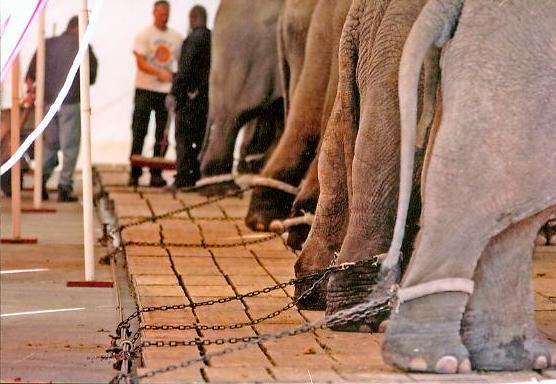Rhode Island became the first state in the nation to pass a ban on cruel bullhooks used to control elephants who perform in traveling shows and circuses, establishing a statewide policy that we’d only seen previously at the local level. We commend Gov. Gina Raimondo for signing this measure into law, and thank Rep. Patricia Serpa, who introduced the bill, Speaker Nicholas Mattiello, Rep. Joe Shekarchi, and Senate President M. Teresa Paiva Weed for their efforts in seeing it through. California lawmakers are expected to pass a similar bill, SB 1062, sponsored by Senator Ricardo Lara in September, and we’ll be working hard to secure that outcome.

For too long, elephants in traveling shows and circuses have suffered through a life on the road punctuated with frequent abuse by handlers wielding bullhooks. Photo by Bradley Stookey/Born Free USA
Almost 60 local jurisdictions across the United States have enacted restrictions on the use of elephants in circuses as a result of growing public awareness. In the past two years, major cities, including Los Angeles, Oakland, Austin, Richmond, Minneapolis, and Spokane have banned bullhooks. On May 1st, Ringling Bros. and Barnum & Bailey Circus stopped using elephants in its traveling shows.
The bullhook is an instrument of torture that resembles a fireplace poker with a sharp metal hook and spike at one end.
For too long, elephants in traveling shows and circuses have suffered through a life on the road punctuated with frequent abuse by handlers wielding bullhooks. This instrument of torture, which resembles a fireplace poker with a sharp metal hook and spike at one end, is used to poke, prod, strike, and hit elephants on their sensitive skin in order to “train” and control them. Elephants are hooked behind the ears, under the chin, on the trunk, and hit on the back of the legs and other sensitive areas, causing the animals stress, trauma, and injuries.
Across the nation, customers are waking up to the cruelties attendant to many local and traveling circus acts. A number of Shrine Circuses are experiencing a decrease in attendance and decline in revenue, with some canceling shows altogether or choosing not to feature exotic animal acts. And Cole Bros. Circus, which has a long history of violating both the federal Animal Welfare Act and the Endangered Species Act – and has experienced numerous elephant rampages – suddenly canceled its 2016 tour and is facing a lawsuit from American Express for nearly $50,000 in unpaid debt.
In many respects, 2016 can properly be characterized as the year of the elephant. In June, the United States announced a near-complete ban on the commercial ivory trade, which marked a historic step forward in ending the global elephant poaching crisis. China has pledged to follow suit. In March, the U.S. Fish and Wildlife Service, responding to an HSUS legal petition, said it will consider increasing Endangered Species Act protections for the African elephant. Several states have passed, or are considering, bans on ivory sales, further cementing our work to protect this iconic species. In Oregon, more than 150,000 citizens recently signed petitions to qualify a ballot measure that would halt wildlife trafficking in the state, restricting any in-state sale of elephant ivory, as well as the parts of 11 other species and taxa of imperiled species, including marine creatures.
Elephants are still in crisis, but it’s immensely encouraging to see policies in the United States changing to reflect our keener understanding and empathy for the largest land animals on the planet.
The post Road to progress for elephants passes through Rhode Island appeared first on A Humane Nation.
Enviroshop is maintained by dedicated NetSys Interactive Inc. owners & employees who generously contribute their time to maintenance & editing, web design, custom programming, & website hosting for Enviroshop.

